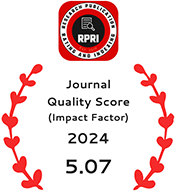Harnessing the Power of Renewable Energy: A Study of Sustainable Sources and Technologies
DOI:
https://doi.org/10.55544/jrasb.3.4.19Keywords:
renewable energy technologies, CO₂ emissions, solar energy, hydropower, wind energyAbstract
This research investigates the capacity of renewable energy technologies to fulfill global energy requirements while mitigating environmental effects, concentrating on primary sources like sun, wind, hydropower, biomass, and geothermal energy. It evaluates the efficacy of various technologies for energy production, efficiency, economic viability, and reduction of carbon emissions. The findings underscore notable progress in solar and wind energy, demonstrating considerable efficiency enhancements (5% for solar PV, 10% for wind turbines) and cost reductions (67% and 64%, respectively) during the last decade. Hydropower is the most efficient energy source, converting 90% of available energy, albeit it is geographically constrained. The research highlights the environmental advantages, noting that renewable technologies substantially decrease CO₂ emissions—hydropower and wind energy prevent 250,000 and 120,000 metric tons of CO₂ annually, respectively. Nonetheless, obstacles such as the variability of solar and wind energy, elevated expenses associated with biomass and geothermal energy, and regional variations in implementation persist as substantial impediments. The research highlights the need for further developments in energy storage, grid modernization, and legislative assistance to expedite the worldwide shift towards renewable energy. This study synthesizes current statistics and trends, emphasizing the vital role of renewable energy in attaining a sustainable, low-carbon future, while also tackling ongoing economic and infrastructural problems.
Downloads
Metrics
References
Ózsef Benedek, Tihamér-Tibor Sebestyén, Blanka Bartók (2018) Evaluation of renewable energy sources in peripheral areas and renewable energy-based rural development Renewable and Sustainable Energy Reviews.90:516-535.
Dawn, Subhojit Dawn, Prashant Kumar Tiwari, Arup Kumar Goswami, Manash Kumar Mishra. (2016). Recent developments of solar energy in India: perspectives, strategies and future goals. Renewable and Sustainable Energy Reviews.62:215-235.
B.N. Prashanth, R. Pramod, G.B. Veeresh Kumar (2018) Design and development of hybrid wind and solar energy system for power generation. 5(5):11415-11422.
Abhigyan Singh, Alex T. Stratin, N.A. Romero Herrera, Debotosh Mahato, David V. Keyson, Hylke W. van Dijk (2018) Exploring peer-to-peer returns in off-grid renewable energy systems in rural India: an anthropological perspective on local energy sharing and trading Energy Research & Social Science.46:194-213.
J. Jeslin Drusila Nesamalar, P. Venkatesh, S. Charles Raja (2017) The drive of renewable energy in Tamilnadu: Status, barriers and future prospect Renewable and Sustainable Energy Reviews.73:115-124.
Subhojit Dawn, Prashant Kumar Tiwari, Arup Kumar Goswami, Ankit Kumar, Singh Rajesh Panda (2019) Wind power: Existing status, achievements and government's initiative towards renewable power dominating India Energy Strategy Reviews.23:178-199.
Nimish Kumar, Nitai Pal, The existence of barriers and proposed recommendations for the development of renewable energy in Indian perspective, Environment, Development and Sustainability, pp1-19.2018.
Rehman S, Hussain Z (2017) Renewable energy governance in India: challenges and prospects for achieving the 2022 energy goals Journal of Resources, Energy and Development. 14(1):13–22
Akash Kumar Shukl (2017) Renewable energy resources in South Asian countries: challenges, policy and recommendations. Resource-Efficient Technologies 3: 342-346.
Charles Rajesh Kumar. J, Mary Arunsi. B, Jenova. R, M.A. Majid (2019) Sustainable waste management through waste to energy technologies in India—opportunities and environmental impacts. International journal of renewable energy research 9(1): 309-342.
Kumar S (2016) CO2 emission reduction potential assessment using renewable energy in India. Energy 97:273–282
Blondeel M, Van de Graaf T (2018) Toward a global coal mining moratorium? A comparative analysis of coal mining policies in the USA, China, India and Australia. Climatic Change 150(1-2):89–101
Pappas D (2017) Energy and Industrial Growth in India: The Next Emissions Superpower? Energy procedia 105:3656–3662
Charles Rajesh Kumar. J, Vinod Kumar. D, M.A. Majid (2019) Wind energy programme in India: emerging energy alternatives for sustainable growth. Energy & Environment 30(7):1135-1189.
Kumar. J, C.R., Majid, M.A. Renewable energy for sustainable development in India: current status, future prospects, challenges, employment, and investment opportunities. Energ Sustain Soc 10, 2 (2020). https://doi.org/10.1186/s13705-019-0232-1
Downloads
Published
How to Cite
Issue
Section
License
Copyright (c) 2024 Shivani Pawar

This work is licensed under a Creative Commons Attribution-NonCommercial-NoDerivatives 4.0 International License.


















